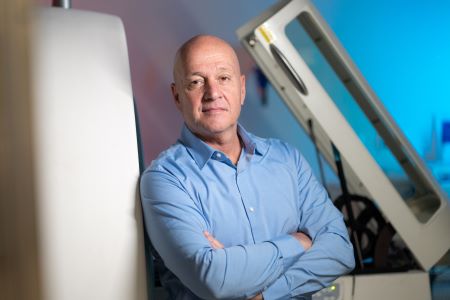
Inaugurated in 2020, the vision of the Wohl Institute for Translational Medicine is already a reality.
The mission of Hadassah’s Wohl Institute for Translational Medicine is to serve as a national center for innovative preclinical research, promoting studies designed to elucidate unsolved human diseases and the development of new therapies, for the benefit of all. Scientists, researchers, clinicians, and industry partners join together at the Institute to make research breakthroughs happen and to translate discoveries into innovative healthcare treatments.
Fifty research groups have partnered with the Institute on vital challenges in medical science ranging from oncology, orthopedics, cardiology, neurology, metabolic syndrome, diabetes, and kidney disease to aging. Research at the Institute has generated over 40 peer-reviewed scientific articles in leading journals, and a new generation of young scientists is being trained to leverage advanced preclinical imaging for scientific medical research.
Head of Hadassah Research and Development, Prof. Eyal Mishani, affirms, “The Wohl Institute has greatly advanced the quality of our research, fulfilling its charter as a bridge between basic research at the Hebrew University and preclinical research at Hadassah, leading to clinical trials.”
“The Wohl Institute is a bridge between basic research at the Hebrew University and preclinical research at Hadassah, leading to clinical trials.” – Prof. Eyal Mishani, Head of Hadassah Research and Development Division

Mishani notes that key accomplishments of the Institute include the integration of advanced instrumentation into biomedical research, using highly sophisticated hybrid modalities. This capability has enriched and accelerated Hadassah’s research output and attracted collaboration with research groups from academia, hospitals, and industry, resulting in new medical breakthroughs.
“We offer comprehensive pre-clinical imaging technologies, which are the first of their kind in Israel,” explains Prof. Rinat Abramovitch, who heads the Wohl Institute. “Our unique advantage is that we enable scientists to actually see the internal functioning of the organs. We tailor a non-invasive imaging solution to each research project for animals that mimic the human manifestation of a disease.”
The Wohl Institute includes an organoid center. Miniature 3D tissue culture replicas of our body organs, organoids are powering a revolution in biomedical research, transforming our ability to model the impact of disease and promising breakthroughs in personalized medicine.
Mishani imagines a future center in which scientists and physicians from all fields of medicine work together in an integrated research hub under one roof. This will nurture an ecosystem fostering close daily interactions between clinicians and scientists, which will lead to transformative solutions for combatting disease. Basic research will benefit from access to Hadassah’s extensive clinical database, and new AI algorithms will be integrated into drug development for emerging diseases.
Research Highlight: The Secret to a Long and Healthy Life
The underlying science leading to a dramatic extension of a healthy lifespan was the result of a collaboration between scientists at the Hebrew University, Hadassah, and the Wohl Institute. Published in Science, the team led by Prof. Eli Keshet and Dr. Myriam Grunewald found that the Vascular Endothelial Growth Factor (VEGF) signaling protein plays the central role in organ aging, and a modest increase of VEGF can increase a healthy lifespan.
Mai picture caption: Prof. Eyal Mishani, Head of Hadassah Research and Development
This article was originally published in the Hadassah International 2021 Year in Review which you can check out HERE.
